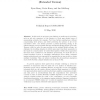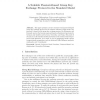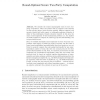1656 search results - page 127 / 332 » Secure Computation Without Authentication |
124
click to vote
PET
2010
Springer
15 years 6 months ago
2010
Springer
In this work, we propose a new platform to enable service providers, such as web site operators, on the Internet to block past abusive users of anonymizing networks (for example, T...
146
click to vote
ASIACRYPT
2006
Springer
15 years 6 months ago
2006
Springer
This paper presents a secure constant-round password-based group key exchange protocol in the common reference string model. Our protocol is based on the group key exchange protoco...
109
click to vote
CRYPTO
2004
Springer
15 years 8 months ago
2004
Springer
Abstract. We consider the central cryptographic task of secure twoparty computation, where two parties wish to compute some function of their private inputs (each receiving possibl...
108
click to vote
INFOCOM
2008
IEEE
15 years 9 months ago
2008
IEEE
—Anonymity has received increasing attention in the literature due to the users’ awareness of their privacy nowadays. Anonymity provides protection for users to enjoy network s...
116
click to vote
SP
1998
IEEE
15 years 6 months ago
1998
IEEE
A strand is a sequence of events; it represents either the execution of legitimate party in a security protocol or else a sequence of actions by a penetrator. A strand space is a ...



